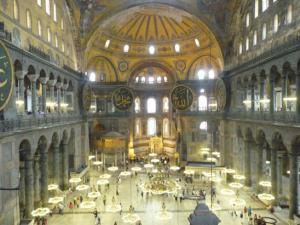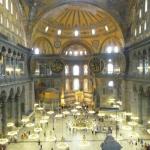 The twentieth century loved to speak of “revolutions” . . . even in the area of thought. The outcome was not promising. In the history of ideas, I think it better to think of development as “biological” instead of as revolutionary. Ideas build on each other. In fact, if anything evolves, human thought evolves. The story of intellectual development is less the story of Kuhn-like paradigm shifts, then it is the tale of slow and gradual growth in understanding with many set backs as well.
The twentieth century loved to speak of “revolutions” . . . even in the area of thought. The outcome was not promising. In the history of ideas, I think it better to think of development as “biological” instead of as revolutionary. Ideas build on each other. In fact, if anything evolves, human thought evolves. The story of intellectual development is less the story of Kuhn-like paradigm shifts, then it is the tale of slow and gradual growth in understanding with many set backs as well.
If the Greeks were mistaken to believe that there was Golden Age of the intellect to which all humanity could only look back, then the modern notion of intellectual progress is just as deceptive. While humanity has gone forward in some areas, sensitivity to ecological concerns, it is has decayed in others. This is true in every area. Just as the advent of processed foods has not been an unmixed blessing, so the easy availability of entertainment may not be good for the race.
In short, it is a prejudice to believe the ancients could teach us nothing. As Lewis argues in his Discarded Image and in a preface to When God Became Man, we are unlikely to imitate the mistakes of the past, but also likely to discover long lost virtues.
For example, the poetry of Dante demonstrates a sublime integration of every area of knowledge. His vision is a holistic one that has a place for every idea that he believed. His thoughts are presented in matchless poetry with precision and grace. His sublime art reminds us that not all change has been positive since his day.
This suggests that conservatism in thought is not a bad thing. Most intellectual changes are faddish and long forgotten. To quote a mentor, Sheldon Vanauken, “the up to date is forever dated.” Except in the cases of the staggering geniuses of history, such as Socrates, Shakespeare, Newton, or the Christ, progress is incremental. Such inspired genius is very rare.
Even the inspired genius owes something to his intellectual mother and father. Shakespeare is matchless, but he is not a theatrical Adam, parentless other than God. A Christian is, therefore, entitled to moderation in his view of intellectual progress. He is right to distrust announcement that, at long last, he must abandon the faith of his fathers.
He is a prudent, or moderate, man. The prudent man avoids intellectual defect and excess.
Moderation has become almost a dirty word amongst academics and Christians, because too many people confuse moderation with a lack of zeal or commitment. Many people who claim to be moderate are simply confused intellectually or being disingenuous about their views in order to keep the peace.
Aristotle would urge sanity in our pursuit of our goals. For the Philosopher, moderation meant avoiding excess or defect in areas not inherently base. (Nicomachean Ethics). He would remind us not to confuse moderation with a call to reactionary repetition of what has worked in the past.
The reactionary is defective in his pursuit of truth, just as the revolutionary is excessive. The fundamentalist Christian school that refuses to recognize problems, is never blessed with uncertainty, and that merely repeats what it has been given is not prudent. Entering the intellectual fray means putting truths in new ways for each generation and exposing ideas to opposition. Opposition in a normal person leads to doubt, but this need not be the corrosive doubt of the extreme skeptic. Instead, moderate amounts of doubt can lead to new insights about the old truth, as the defender reflects on his nagging worries. Just as the stingy man gets to joy out his horded money, so this type of Christian gets no benefit from his horded truth. For me, and for my colleagues at the Torrey Honors Institute this has mostly been a joyous process.
The great success of one science may tempt us to adopt standards of intellectual achievement in all areas. The literature professor is tempted to find “new things” in Shakespeare, instead of passing on the beauty recognized from old. The arts can teach us much about what it is to be human, but the methods and means of the arts are not the same as those of science.
Some believe that they should merely adopt the view of reality that makes the most sense of the matter and energy in it. They act as if there is some virtue in believing an uncomfortable truth, just because it is uncomfortable. Instead, I would suggest that we are well within our rights to root intellectually for the good and the beautiful as long as we reasonably can. Any other view does not take all of our humanity into account.
Christian educators, scientists, and theologians must never forget the importance of beauty and of the types of reason that persuade the human heart. Joy is a good reason to adopt a view, after all. A view of the world that leaves us cold hearted and full of toxic doubts and fears is no more desirable than one that ignores the mind.
I believe that God often speaks to our hearts through beauty and confirms His Word through intense religious experience. Ideally, this conforms to our best theories about the data that our senses deliver to us about the external world in one authentic and consistent whole. One thing confirms another in a bi-conditional relationship.
Sadly, in a fallen world things are never so simple.
Based on a presentation at Loma Linda University and at the College at Saint Constantine.











